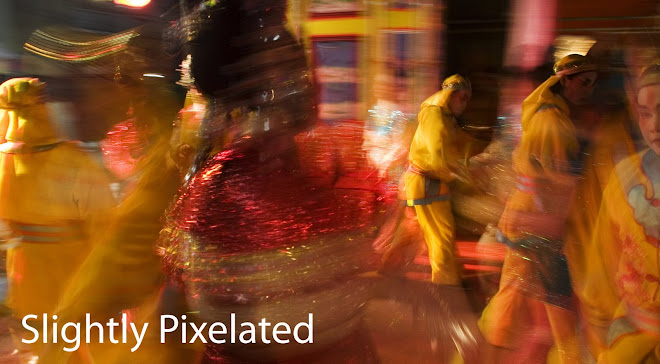
Everybody loves it. Everybody wants it.
The Greeks thought it up and gave us the etymology. The Europeans adopted and exported it. The Americans fell in love with it and might well drop a bomb on you to bring you it.
Democracy has become the 'holy grail' of modern politics.
Throughout the planet, politicians and political parties vie to be 'more democratic than thou'. Even the occasional dictator or well-meaning totalitarian regime will claim the mantle of democracy: Pol Pot's 'Democratic Kampuchea' being a particularly chilling example.
So it is no surprise that in Thailand's hair-trigger stand-off both groups, though diametrically opposed, are fighting on the side of democracy.
In one corner, sporting royal yellow, is the People's Alliance for Democracy (PAD). In the other, sporting red (like the bull?), is the United Front for Democracy Against Dictatorship (UDD).
The beauty of democracy, like religion, is all you have to do is believe in it. You can explain it any way you like. Dress it up in the clothes you fancy. Stand it on its head and make it dance a Russian jig. Just say it's 'for the people'. Or at least that's what the politicians hope.
But there will always be those standing on the sidelines watching your political dance, the irksome analysts, who will claim haughtily that it's not orthodox, not democratic, even, horrors, anti-democratic (which is the modern equivalent of political heresy).
The PAD has been a popular target for the democratic doubters.
And there is easy grist for their mills.
The PAD's 'new politics' proposal outlines a system that would see only a minority of representatives (30%) elected directly by a majority of 'the people' while the other 70% would be chosen or 'nominated' by another group of 'people' drawn from an unspecified 'superior grade' of anonymous voters selected, presumably, from the trusted inner circles of power.
Government of the people, by the people and for the people is what your standard democratic government claims to be about. But which group of people are they really talking about? Is it fair to label a movement like the PAD anti-democratic just because they advocate a system where the majority would have the right to choose only a minority of the government's elected representatives?
The answer, of course, is that democracy comes in about as many shades, shapes and forms as the imagination has room for. So, no, the PAD is not strictly anti-democratic. It is, as its leaders claim, simply proposing a different form of democracy which in principle shouldn't make it any less valid in the global democratic beauty pageant - alongside Pol Pot's Democratic Kampuchea, the UK, the US and the Democratic People's Republic of Korea - than any other.
The argument over 'democratic or not democratic' is irrelevant.
In Thailand there is plenty of debate about the relevance of democracy. It's a western idea claim many members (and leaders) of the PAD (who all the while claim to be democratic) and as such is not appropriate for Thailand which needs its own indigenous political model. The suggestion is that Thailand, like some of its Asian neighbours, will concoct its own form of 'Asian' democracy.
Such arguments are also irrelevant; smokescreens designed to leave us wandering down ideological blind alleys.
Theories that pit Western democracy against Asian democracy are the convenient rallying calls of the xenophobes and nationalists. For democracy is so diffuse an idea as to make it adoptable by just about anyone for any political purpose, as history has shown.
In reality (obviously in fact), what the PAD and the UDD, and all the other political players on this planet, are struggling for, most fundamentally, is power and the right to exercise it on behalf of the 'people' they represent - whether the majority or not.
And here's the rub. There is a global consensus, driven powerfully by Western thinking, that the best form of democracy is one where power is exercised not just on behalf of 'the people' (all leaders claim this) but that the majority of people on whose behalf such power is being exercised should be given the right to choose their leaders.
The PADs new politics proposals are unpopular (most notably in Western circles) because they do not respect this convention, arguing instead that the interests of the majority are not best served by allowing the majority, with all its defects of poor education, poor information and susceptibility to corruption, to choose its leaders. China doesn't subscribe to the majority system and wealth is expanding there at breakneck speed (with some notable negative side-effects). Singapore too, where many Western businesses see fit to make their base, is far from the Western democratic ideal.
Perhaps the strongest argument against the proposals of the PAD, however, are not that they are undemocratic but that they do not define how 'new politics' would guarantee that those empowered to choose Thailand's new leaders would in fact be 'good people' or 'khon dee' - thereby preventing a slide toward the 'illiberal democracy' of the Thaksin era.
The most deeply held political aspiration of Thais today, I believe, is not the removal of the majority vote in favour of an enlightened ruling minority but a removal of the endemic corruption that has afflicted Thai politics for decades.
It is ultimately more important, therefore, that Thailand establish mechanisms for producing good leaders (khon dee) and a framework for effectively policing corruption, rather than arguing over which interest group (the PAD or the UDD) should have the right to exercise power on whose behalf.
For as we all know power has a tendency to corrupt.













